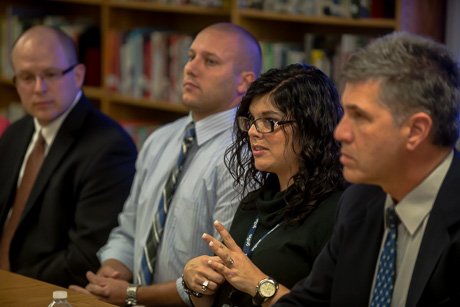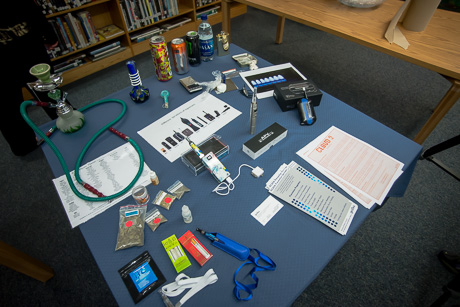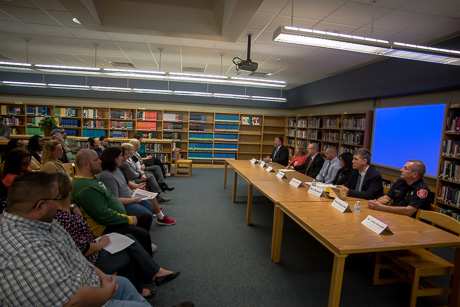
There have been four incidents at Batavia High School so far this school year involving students, vaporizers and synthetic drugs, Principal Scott Wilson said.
That isn't an epidemic by any means, but it is a cause for concern and he thinks the local community, and particularly parents and students, should be more aware of some of the possible negative consequences of vaporizers, also known as e-cigarettes.
Wilson organized a community forum in the school's library Wednesday night to help raise awareness.
"It's a concern right now, but I don't want to be a Chicken Little and say the sky is falling," Wilson said. "I also don't want to say the problem is not there, and bury my head in the sand and cross my fingers and hope it all blows away. We have to find the right balance."
Wilson assembled a panel for the forum that included Nancy Haitz, school nurse, Nate Korzelius, teacher, Nick Burk, a teacher and coach, Jennifer Zambito, from GCASA, Rich Schauf, Batavia PD, and Tom Douglas, from the fire department.
Each shared some of their experiences or research into issues surrounding vaping and synthetic drugs.
E-cigarettes were developed as an alternative to tobacco cigarettes. They were designed to be nicotine delivery devices, but without the health consequences of cigarettes, and give smokers a device to smoke in public that is largely unregulated.
The devices were barely available a couple of years ago, and now are commonly sold in retail shops and convenience stores throughout the area.
Not much bigger than a nice ball-point pen, the devices are easy for students to conceal. They've supposedly been hidden by students in bras and spandex undergarments.
If it were just a matter of students smoking flavored liquid with a little nicotine, that would still be a violation of school rules and not allowed, but the problem is a bit more serious than that, Wilson said.
"We have to assume at this point that the liquid contains a substance that could cause a medical emergency and I have to take a firm stand," Wilson said.
EMTs have been summoned to the school once this year after a medical emergency involving a student who reportedly inhaled synthetic marijuana through a vaporizer.
They way e-cigs entered society, there's a common misperception that they're harmless, Wilson said.
Both he and Schauf shared stories of talking to parents who bought vaporizers for their children, as young as 13 years old, because they saw them as a safe alternative to tobacco cigarettes.
What parents don't realize is that these devices can be used to deliver other chemicals, from ground up prescription pills to a plethora of synthetic drugs that are easily obtained online.
These are often the same drugs or closely related cousins to bath salts -- the drugs that were much in the news two years ago when the country -- and our local community -- were concerned about their health effects.
Zambito described many of the same behaviors and consequences -- paranoia, hallucinations, rapid heart rates, rapid breathing, even seizures.
"Students can experience symptoms that even they themselves are scared of," Zambito said.
One of the biggest concerns, several panelists said, is the possibility of students who think taking a hit from another student's vape is no big deal, without really knowing what chemical is in the e-cigarette.
It could contain a synthetic drug and there's no way to tell from merely looking at it.
"Let that sink in for a moment," Wilson said. "They don't know what is in it because it's in a liquid. That's the real concern. We want to help kids make better choices and never just blindly take that risk."
The difficulty in finding out what chemical might have caused a medical emergency is also a problem for EMTs, said Douglas.
Too much nicotine can cause an elevated heart rate, but so can other chemicals, and that can be an important distinction, Douglas said, as just an example of what EMTs must deal with in these situations.
"We've got them grinding up prescription drugs, THC, to whatever it is they find on the Internet, Douglas said. "From the EMT end, that's what we're dealing with. We can be kind of stymied. What do we treat?"
Korzelius and Burk said they now regularly inspect bathrooms, lifting up ceiling tiles, looking for hidden vaporizers.
In the days of "smoking in the boys' room," there was always a residual odor that would help teachers track down the smokers, but that isn't the case with vaping, and teachers and administrators are struggling to keep a tab on the devices.
Wilson hopes through a public discussion of the issue parents become more aware and more vigilant, but he said teens at BHS are already starting to take the issue seriously.
"I think most of the kids want to have a healthy, clean and positive school environment," Wilson said. "I totally believe that with all my heart, and students are stepping up and reporting, because they want, not necessarily to get kids in trouble, but keep the school free from these devices. I love that cooperation and even that peer pressure. "




"We've got them grinding up
"We've got them grinding up prescription drugs, THC, to whatever it is they find on the Internet, Douglas said. "From the EMT end, that's what we're dealing with. We can be kind of stymied. What do we treat?"
sounds like Douglas knows the student body well. I'm not an EMT but I can tell you what you treat, you treat them like any other call. just because somebody ingests something via a vaporizer doesn't make it any different then if they used a straw, a needle, smoke or any other clever means.
appears to be a lot of hype over nothing.
as for the vaping itself,how about leaving the responsibility of childrens habits to the parents of such? you want to vape, you want your kids to vape? go ahead knock yourself out it's none of my business and none of the schools either.
Any activity such as this is
Any activity such as this is definitely the school's and the community's business and responsibility to control.
As an EMT, I have to
As an EMT, I have to completely disagree with you David. You can't treat if you don't know enough of the surrounding circumstances. Needles, straws, smoking apparatuses - these tools give us a general idea of what was ingested/taken in. We add this to our observation of the patient and determine how to treat the patient. Even at worst case scenarios, we at least know what NOT to do given our evaluation.
But in the case of vaping, anything could have been taken in. They leave pretty much nothing to suggest what is in the liquid. So we can't treat the patient. We can only do the best we can to keep the patient stable, which is profoundly difficult.
It's an additional concern when we can't give a solid report to the hospital so they can help the patient. So they have to take time to figure out what was taken in.
So yeah, quite a serious concern.
As for vaping on school property, ban it. Even if the concern was just nicotine, it still creates a health risk to the child inhaling it. Schools promote, teach, and protect healthy life choices. To turn to do anything else because either "the second hand smoke isn't a prominent issue" or because "it's their choice" is an extremely disenfranchised act toward our child. Remember, the health concern to the students isn't just for the students making blatant unhealthy/self distinctive choices, it's also for those witnessing them.